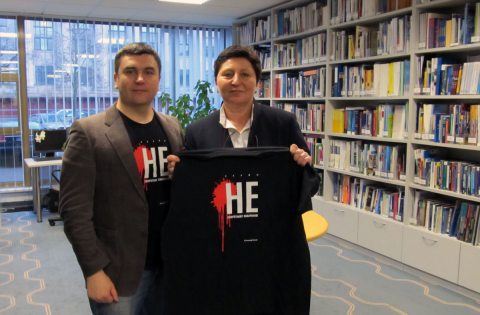“Human Rights Defenders Against the Death Penalty in Belarus” under patronage of Lithuanian MP
-

- Dalia Kuodyte, member of the Lithuanian Parliament, and Andrei Paluda, coordinator of the campaign “Human Rights Defenders Against the Death Penalty in Belarus”
According to Dalia Kuodyte, member of Parliament of Lithuania, she will patronize the campaign “Human Rights Defenders Against the Death Penalty in Belarus” with the intent to distribute information about this issue in the framework of her powers. She was approached with the proposal by a representative of the human rights organizations Freedom House Vitis Jurkonis. Dalia Kuodyte announced her decision during a debate on the situation in Belarus, which was held at the Lithuanian Seimas last week. One of the issues under discussion was the death penalty.
In an interview for the website spring96.org, Ms. Kuodyte spoke about her attitude to the presence of the death penalty in the neighboring Belarus and the situation of human rights in general.
- I am very pleased that Vitis invited me to be a patron of this campaign. Indeed, Belarus is the only country in Europe to apply the death penalty. And I think it’s unnatural, it is against human nature. We have no right to take the life of even the murderer, as we are not given this man’s life. Indeed, it makes sense to talk about it and to fight against such actions. In the context of human rights it is, in my opinion, doubly important.
- What can you say about the attitude towards the death penalty in Belarus at the level of the Lithuanian state? As far as we know, representatives of the Embassy of Lithuania in Minsk are not included in the Working Group on the death penalty in Belarus, formed by representatives of the embassies of other EU countries...
- It’s hard to say something about this, but I will inquire why our ambassador is not involved in this coalition. Maybe, he does not have some information. But I think, as a European country, we will always be uniquely for Belarus not only to abolish the death penalty, but for human rights to be really up to certain standards. While it is important to understand that in order to do this something must change within the Belarusian society, too. Of course, you can hope, ask for help - and it's not a shame and not scary. That’s what you should do. But if you do not change the mentality of society, if there is no critical mass of people for whom not only bread is important, nothing happens. Pressure from the outside - it's a kind of mechanical pressure. People should understand... I also heard from the Belarusians that “everything is in order, I have a house there, a tractor, a car; and I come to Vilnius for shopping, good roads, cultivated fields... What are you talking about?” If a person lives in his own little world, if he does not need freedom in fact, it is very difficult to hope that there will be some fundamental changes at the political level.
- What, in your opinion, helped Lithuanian society turn their minds towards democratic processes, human rights, understand their importance? After all, Lithuania, as well as Belarus, share the common Soviet past...
- But you know, before the war we had twenty years of freedom, which almost saved us, because we created a normal democratic, by those standards, state with a strong national identity. During these twenty years we managed to create the Lithuanian nation. If we had had fifty more years of Soviet “paradise”, it probably would be a situation similar to Belarus. But we reached 1990 with the people who used to belong to that Lithuania and they transmitted the spirit of freedom to their children. For us it was a splash - when the chief value was freedom, and there was such a critical mass. In the three-million Lithuania, rallies gathered a hundred, two hundred thousand people who came from all over the country to stand shoulder to shoulder for a couple of hours, everyone was like one fist. It was a very strong emotion. But then, as usual, weekdays come... And step by step we started understanding what human rights are like, started building a normal democratic state. But all this was not arisen suddenly. Even now, we must constantly repeat to many in our Parliament that all everyone has the right - the freedom of speech and freedom of assembly, and that gay people are also people and have the right, like all the others, and the like. I think the time will come when Belarus goes this way - a thorny one, but towards freedom. Still, something must awake the souls of people. Belarus has already formed NGOs - people who understand the essence of human rights. I understand that it is very difficult in today's environment to get to the consciousness of the people, to convey the desired information. But honor belongs to those who do.
On December 9, the Lithuanian Seimas hosted a photo exhibition “Capital Punishment”, created within the framework of the campaign “Human Rights Defenders Against the Death Penalty in Belarus”.




